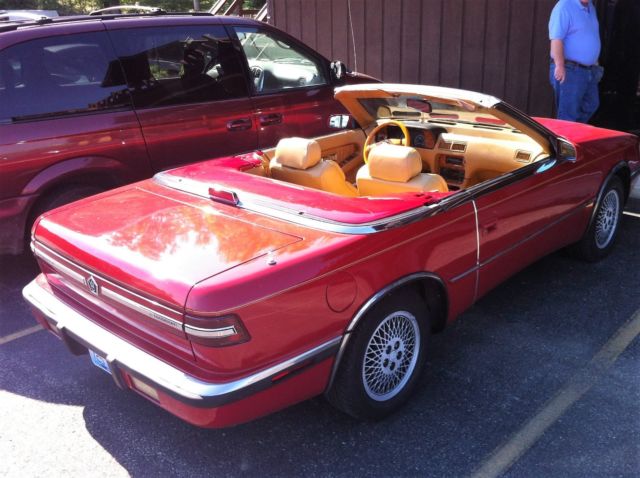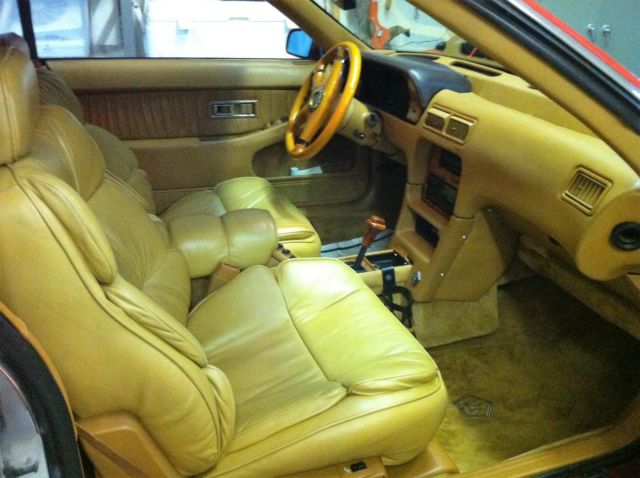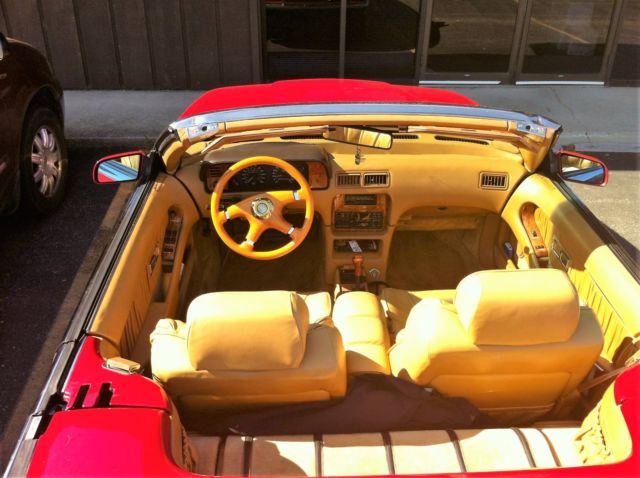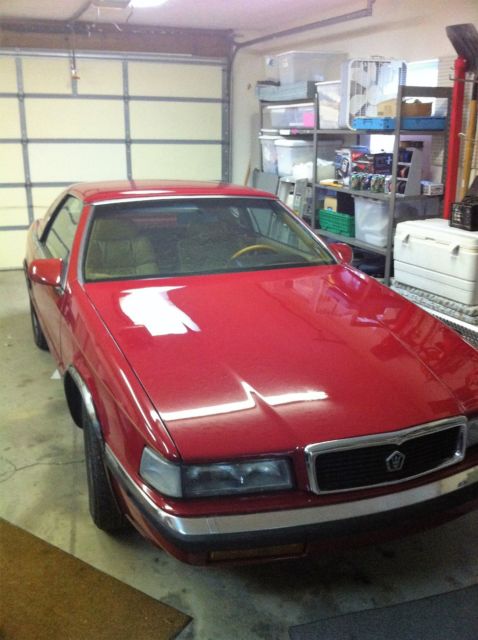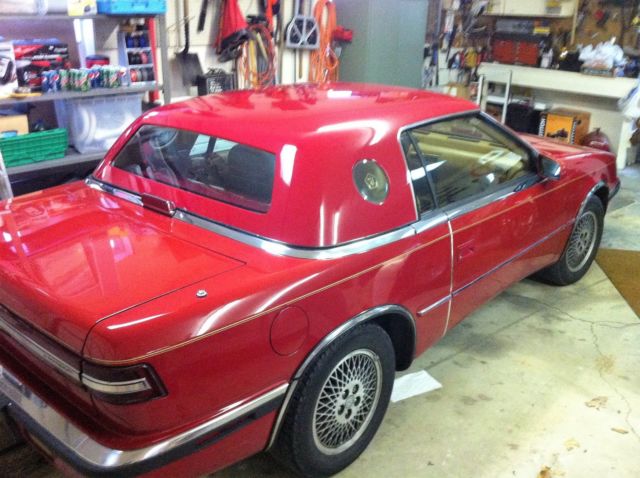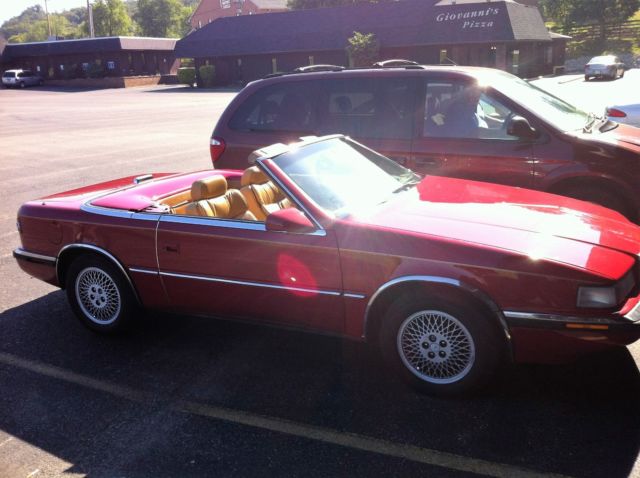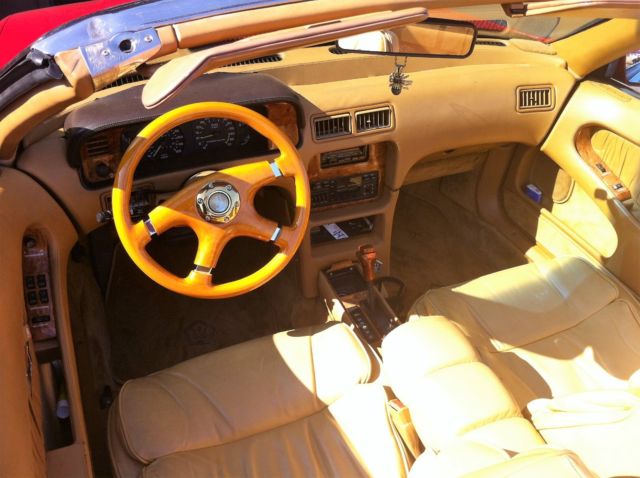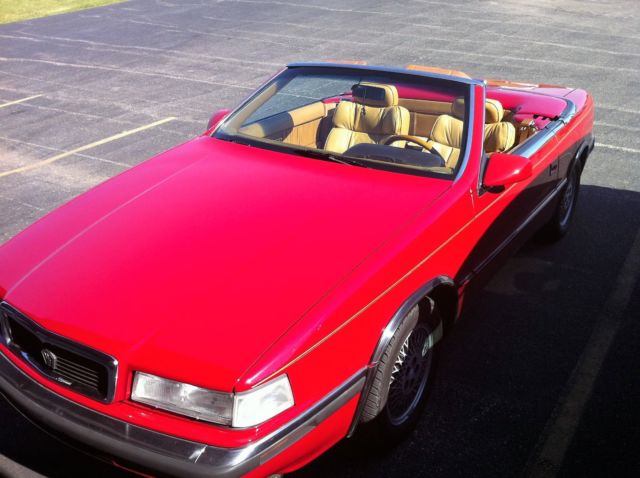1989 Chrysler TC Maserati **Garage Kept** No Reserve
- Price:
- Location: Ashland, Kentucky, United States
- Condition: Used
- Make: Chrysler
- Model: TC
- Type: Convertible
- Trim: MASERATI
- Year: 1989
- Mileage: 67,529
- VIN: ZC2FP110XKB201948
- Color: Red
- Interior color: Tan
- Vehicle Title: Clear
1989 Chrysler TC Description
THIS IS A VERY NICE CAR IN EXCELLENT CONDITION...GARAGE KEPT...NO RESERVE AFTER MINIMUM BID IS MET.History of the 1989–1991 Chrysler TC by Maserati
In 1987, Cadillac had its Allante, a semi-exotic flagship with bodies built in Italy by Pininfarina and shipped to the U.S. for assembly. In 1988, Buick had its Reatta, another two-seat semi-exotic flagship. Planning for Chrysler’s own two-seat semi-exotic began in 1984, with the signing of a memorandum of understanding between Chrysler and Alejandro de Tomaso.
The new TC was slated for introduction in 1987, but it took two additional years to hit the market. It debuted after the lower-tier and similarly styled LeBaron convertible, thus denting its flagship status from the start. Instead of the new look being passed from the top down, the public got the chance to buy a lower-priced car with a similar look first. This essentially doomed the TC before it even started.
Still, the TC was a hand-crafted car, with some nice details, especially the leather upholstery. Pricing ran in the $30,000–$33,000 range when new, which was about what a standard Corvette cost and half the price of the Allante, though about $4,000 above the Reatta.
Initially, the TC came with a 160-hp 2.2-liter turbocharged and intercooled four, with the option of a 200-horsepower “Maserati” variant with special 16-valve head and equipped with a German Getrag five-speed transaxle. By the 1990 model year, Chrysler had heard enough from buyers about turbo lag and the rough nature of the engines, and it offered up a Mitsubishi-supplied 3.0-liter single-overhead-camshaft V-6 as found in sedans and minivans. The V-6 replaced the standard four cylinder, and had a new four-speed automatic transaxle. The engine was as smooth but offered up only 141 horsepower. The 200-hp engine and five-speed continued as an option.
Production ended in calendar year 1990, though a few 1991 model-year cars were produced. Approximately 7,300 units were built in total.
The Chrysler TC car had plenty of substance, with technology befitting what the Brits refer to as a “bespoke” high-end vehicle. And it was truly international beyond its styling partnership: A Teves anti-lock braking system was employed, and struts and shocks were specially developed by Fichtel and Sachs. The alloy wheels were fabricated in Italy by Formula One supplier Fondmetal. Forged pistons for the 200-hp engine were supplied by Mahle of Germany, and Japanese firm IHI supplied the turbocharger.
Aficionados consider these to be the best Maserati ever built — certainly less finicky than the high-strung V-6 and V-8-powered true exotics — as well as the best Chrysler ever built. In the current market, they are a hand-built bargain, though restoration candidates will put you underwater fast. Better to buy the best one and take care of it.
 1989 Chrysler Maserati Convertible NO RESERVE
1989 Chrysler Maserati Convertible NO RESERVE
Mileage: 70,494
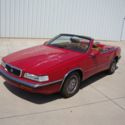 1989 Chrysler tc Maserati Convertible NO RESERVE
1989 Chrysler tc Maserati Convertible NO RESERVE
Mileage: 44421
 1989 CHRYSLER TC BY MASERATI CONVERTIBLE NO RESERVE!
1989 CHRYSLER TC BY MASERATI CONVERTIBLE NO RESERVE!
Mileage: 65,272
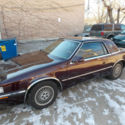 1989 Chrysler Maserati TC - 23k original miles (No reserve)
1989 Chrysler Maserati TC - 23k original miles (No reserve)
Mileage: 23,553
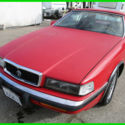 1989 Chrysler TC by Maserati Automatic 4 Cylinder Turbo NO RESERVE
1989 Chrysler TC by Maserati Automatic 4 Cylinder Turbo NO RESERVE
Mileage: 52931
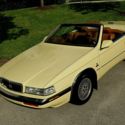 1989 CHRYSLER TC BY MASERATI ONE OWNER MASERATI INTER-COOLED ENGINE 5 SPD MANUAL
1989 CHRYSLER TC BY MASERATI ONE OWNER MASERATI INTER-COOLED ENGINE 5 SPD MANUAL
Mileage: 36000
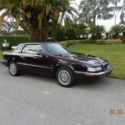 1989 Chrysler TC by Maserati w/rare factory 16v turbo Maserati Engine!!
1989 Chrysler TC by Maserati w/rare factory 16v turbo Maserati Engine!!
Mileage: 40442
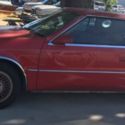 1989 Chrysler's TC by Maserati - No reserve, Rare car, 72,500mi, Runs great
1989 Chrysler's TC by Maserati - No reserve, Rare car, 72,500mi, Runs great
Mileage: 72,546
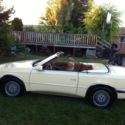 1989 chrysler tc maserati turbo 2.2 , HIGHEST BID WINS MASERATI TC
1989 chrysler tc maserati turbo 2.2 , HIGHEST BID WINS MASERATI TC
Mileage: 100
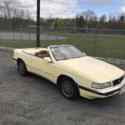 1989 Chrysler TC Maserati Convertible Yellow FWD Automatic BY MASERATI
1989 Chrysler TC Maserati Convertible Yellow FWD Automatic BY MASERATI
Mileage: 101235
